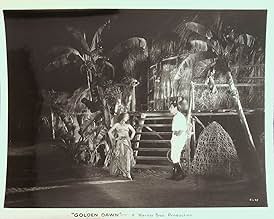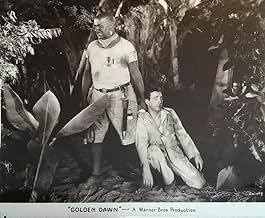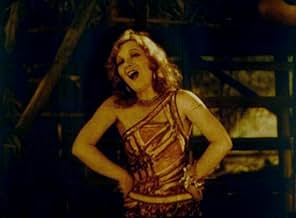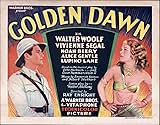अपनी भाषा में प्लॉट जोड़ें"Golden Dawn" is a musical operetta released by Warner Brothers, photographed entirely in Technicolor, and starring Walter Woolf King and Noah Beery. The film is based on the semi-hit stage ... सभी पढ़ें"Golden Dawn" is a musical operetta released by Warner Brothers, photographed entirely in Technicolor, and starring Walter Woolf King and Noah Beery. The film is based on the semi-hit stage musical of the same name by Oscar Hammerstein II and Otto Harbach."Golden Dawn" is a musical operetta released by Warner Brothers, photographed entirely in Technicolor, and starring Walter Woolf King and Noah Beery. The film is based on the semi-hit stage musical of the same name by Oscar Hammerstein II and Otto Harbach.
- निर्देशक
- लेखक
- स्टार
Walter Woolf King
- Tom Allen
- (as Walter Woolf)
Sôjin Kamiyama
- Piper
- (as Sojin)
Eduardo Cansino
- Secondary Supporting Role
- (बिना क्रेडिट के)
Nigel De Brulier
- Hasmali - the Witch Doctor
- (बिना क्रेडिट के)
Nick De Ruiz
- Napoli
- (बिना क्रेडिट के)
Frank Dunn
- Secondary Supporting Role
- (बिना क्रेडिट के)
Ivan F. Simpson
- Secondary Supporting Role
- (बिना क्रेडिट के)
फ़ीचर्ड समीक्षाएं
What can I say about Golden Dawn? To describe it as jawdroppingly, breathtakingly, deliriously bad does not come close to doing it the justice it so richly deserves. Film aficionados describe it affectionately as The Second Worst Musical Ever Made (the first being the legendary Howdy Broadway), yet even that hallowed title cannot prepare you for the cheesy wonders in store. Racist, sexist...did I mention racist?...this is a film that must be seen to be believed, and even then you'll wonder if someone slipped you something. The film is based on the semi-hit stage musical of the same name and boasts musical numbers by Oscar Hammerstein, Jr., who really should have known better. From the moment Noah Beery steps on stage in embarrassing blackface to warble an ode to his whip, to the hallucinatory Hymn to Domestic Violence sung (badly) by Marion Byron, to the truly indescribable moment when Vivienne Segal belts out a showstopping "My Bwanna," the laughs just never stop. You'll laugh, you'll cry, you'll wonder who in the hell thought that making a pseudo-Viennese operetta about colonial Africa was a good idea, you'll...but you catch my drift. This movie is available on the Dawn of Sound laserdisc set, but I have decided to hold out for the Collectors Edition Director's Cut DVD with several language tracks, a Making of Golden Dawn documentary, and a whole lot of film-school twaddle on the commentary track. My advice to you is if you insist upon seeing this film-and I cannot recommend it to the faint of heart-do not do so alone! Make sure you are surrounded by friends, and are in a calm, familiar environment. Have oxygen ready and make sure your First Aid kit is fully stocked. It might be best to notify the authorities in advance. I ignored this sage advice for my first viewing and almost swallowed my own tongue. And do not even THINK about popcorn. Golden Dawn is a full-on three martini film. Better yet, just chug the gin from the bottle.
...What a grand time they would have sending up this putrid songfest, based on a stage musical that wasn't very successful to begin with. One of the last of the first wave of movie musicals, and surely one of the worst: a preposterous operetta about a light-skinned African princess and the white soldier who loves her. (It turns out she's white, too, so it's okey-doke. I'm not spoiling anything.) Howlingly racist even for its day, what with the united forces of the noble Old World benevolently keeping the peace among the "heathens" of Boer-controlled Africa. (Can this be the same Oscar Hammerstein who wrote "Show Boat" more or less concurrently?) Ineptly shot, paced, and acted, with a number of white actors in blackface, including an unforgivable Noah Beery, his dusky makeup slowly melting under the hot lights.
All that said, it's a rare chance to see the great stage star Vivienne Segal in a lead, and the famous British comic Lupino Lane do a fun eccentric dance. The Kalman score is quite pretty, too, if you can tune out the lyrics. But unless you're a connoisseur of operetta or a lover of grotesquely bad movies, the whole thing is just about unwatchable.
All that said, it's a rare chance to see the great stage star Vivienne Segal in a lead, and the famous British comic Lupino Lane do a fun eccentric dance. The Kalman score is quite pretty, too, if you can tune out the lyrics. But unless you're a connoisseur of operetta or a lover of grotesquely bad movies, the whole thing is just about unwatchable.
I love this film. The music is perfect. Alice Gentle has a gorgeous voice. Her rendition of "Africa Smiles No More" is lovely. I could listen to her singing for hours. It is such a shame that she only was only featured in two feature films and the other ("Song of the Flame" 1930) is now unfortunately lost. The only other extant film is a Technicolor Vitaphone short entitled "A Scene from Carmen" (1929) which features her singing but is not readily available.
The songs which were written by Otto A. Harbach & Oscar Hammerstein II are superb. I especially love the song "Dawn" as sung by Walter Woolf King who has a delightful baritone voice.
Noah Beery is great as the villain and his bass voice is amazing. Vivienne Segal has the least impressive voice of the cast but is still pleasing.
"In a Jungle Bungalow" sung by Lupino Lane and chorus is another pleasing song.
Some of the reviewers on here are clearly clueless. There is nothing racist about this film. As a matter of fact, the film was banned from many Southern states because it was the exact opposite. Racist audiences were offended by a white man (Walter Woolf King) falling in love with a woman (Vivienne Segal) who had a black mother (Alice Gentle). If you examine the period film trade publications made available by the Media History on the Internet Archive you can verify this fact.
Calling Noah Beery racist for portraying a black man is as absurd as calling Lon Chaney's portrayal of a Chinese man racist in the 1927 picture "Mister Wu." Anyone who knows anything about this period in film history knows that Noah Beery was typecast by Warner Bros. as the studio villain and he played pretty much the same character in all his early talking pictures. For example, in "Bright Lights" (1931) he portrays a villain who is supposed to be Portuguese while in "Oh Sailor Behave" (1930) he portrays a villain who is supposed to be Romanian while in "Song of the Flame" (1930) he was a Russian villain. Are these portrayals likewise racist since he plays for laughs and acts in a stereotypical manner? Absurd.
The songs which were written by Otto A. Harbach & Oscar Hammerstein II are superb. I especially love the song "Dawn" as sung by Walter Woolf King who has a delightful baritone voice.
Noah Beery is great as the villain and his bass voice is amazing. Vivienne Segal has the least impressive voice of the cast but is still pleasing.
"In a Jungle Bungalow" sung by Lupino Lane and chorus is another pleasing song.
Some of the reviewers on here are clearly clueless. There is nothing racist about this film. As a matter of fact, the film was banned from many Southern states because it was the exact opposite. Racist audiences were offended by a white man (Walter Woolf King) falling in love with a woman (Vivienne Segal) who had a black mother (Alice Gentle). If you examine the period film trade publications made available by the Media History on the Internet Archive you can verify this fact.
Calling Noah Beery racist for portraying a black man is as absurd as calling Lon Chaney's portrayal of a Chinese man racist in the 1927 picture "Mister Wu." Anyone who knows anything about this period in film history knows that Noah Beery was typecast by Warner Bros. as the studio villain and he played pretty much the same character in all his early talking pictures. For example, in "Bright Lights" (1931) he portrays a villain who is supposed to be Portuguese while in "Oh Sailor Behave" (1930) he portrays a villain who is supposed to be Romanian while in "Song of the Flame" (1930) he was a Russian villain. Are these portrayals likewise racist since he plays for laughs and acts in a stereotypical manner? Absurd.
The reviews of this one simply compelled me to give it a try; I wasn't disappointed. I love films made at the dawn of sound, and in this case also the dawn of taste, apart from often being entertaining they usually tell me a lot about who we were and who we now are. All white people back then apparently considered they were innately superior to all other races, nowadays gifted with movie-hindsight all races can all afford to be retrospectively superior to everyone in the primitive past, and in both cases, innocently. Where we will end up though is another matter – it even tells me something that the original New York stage play ran to 184 performances in 1927, and that this film in black and white (if you "know black from white") has actually survived Time when much worthier films were left to rot.
Dawn is a white native goddess with a hazy past, white Britisher Tom Allen loves her purely but jet blacked-up native Shep Keyes lusts after her. It was still clunky old Noah Beery for all the make-up though – I just had to laugh at the blackened armpits of his shirt. He's worth watching singing to his whip too. The first song is shrilled out by a blackface Margaret Dumont lookalike – I looked out in vain for Captain Spaulding. Vivienne Segal and Walter Woolf King (pre-Marx's Lasspari) are excellent in their lead roles with every word and every lyric perfectly enunciated, every emotion delivered complete with Capital Letters. I loved Woolf's line at one point about not letting Segal sacrifice herself and "go through with this savage religious stupidity" – out of the mouths of babes! The songs, even when the lyrics make you sit up are in the main dull as ditchwater except for We Two (I was wishing for Eddie Cantor though) and the energetic A Tiger (the routine later bettered in King Of Jazz's Ragamuffin Romeo).
It's exhilaratingly barmy doing Vienna in the jungle, but it must have played pretty old-fashioned and pointless even in 1930. So if you decide to hunt this down as it's probably banned from TV and watch it, keep it in the strict amber of context and you will have a unique experience no matter what your colour or prejudices. Unfortunately I can't say the same for Blazing Saddles (my personal bête noire) which was not innocent but malicious.
Dawn is a white native goddess with a hazy past, white Britisher Tom Allen loves her purely but jet blacked-up native Shep Keyes lusts after her. It was still clunky old Noah Beery for all the make-up though – I just had to laugh at the blackened armpits of his shirt. He's worth watching singing to his whip too. The first song is shrilled out by a blackface Margaret Dumont lookalike – I looked out in vain for Captain Spaulding. Vivienne Segal and Walter Woolf King (pre-Marx's Lasspari) are excellent in their lead roles with every word and every lyric perfectly enunciated, every emotion delivered complete with Capital Letters. I loved Woolf's line at one point about not letting Segal sacrifice herself and "go through with this savage religious stupidity" – out of the mouths of babes! The songs, even when the lyrics make you sit up are in the main dull as ditchwater except for We Two (I was wishing for Eddie Cantor though) and the energetic A Tiger (the routine later bettered in King Of Jazz's Ragamuffin Romeo).
It's exhilaratingly barmy doing Vienna in the jungle, but it must have played pretty old-fashioned and pointless even in 1930. So if you decide to hunt this down as it's probably banned from TV and watch it, keep it in the strict amber of context and you will have a unique experience no matter what your colour or prejudices. Unfortunately I can't say the same for Blazing Saddles (my personal bête noire) which was not innocent but malicious.
True, as a film, this is ludicrous, with "native African" Noah Beery speaking in a combination of U.S. Southern Black ("I'se gwine...")and cowboy dialects ("I'm a gonna pump ya plum full of lead")and some horrendous choreography. But there is some beautiful music from perhaps the greatest composer of Viennese operetta: Emmerich Kalman. This movie is based on Kalman's operetta "Golden Dawn," which premiered in New York in 1927. Especially noteworthy are two Kalman songs: "Just We Two" and a lovely ballad "You Are the One." To fully enjoy the music, one must,of course, ignore the fact that the lilting Viennese melodies and sometimes-Hungarian harmonies seem just a bit out of place in Africa.
क्या आपको पता है
- ट्रिवियाThe Technicolor version is apparently lost; only the black and white version survives.
- गूफ़Composer Herbert Stothart is billed as "Hubert" in the opening credits.
- साउंडट्रैकAfrica Smiles No More
(1930) (uncredited)
Music by Harry Akst
Lyrics by Grant Clarke
Sung by Alice Gentle
टॉप पसंद
रेटिंग देने के लिए साइन-इन करें और वैयक्तिकृत सुझावों के लिए वॉचलिस्ट करें
विवरण
- रिलीज़ की तारीख़
- कंट्री ऑफ़ ओरिजिन
- भाषा
- इस रूप में भी जाना जाता है
- Aurora dorada
- फ़िल्माने की जगहें
- उत्पादन कंपनी
- IMDbPro पर और कंपनी क्रेडिट देखें
- चलने की अवधि1 घंटा 21 मिनट
- रंग
- Color(2-strip Technicolor, original print)
इस पेज में योगदान दें
किसी बदलाव का सुझाव दें या अनुपलब्ध कॉन्टेंट जोड़ें


















